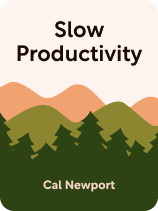

This article is an excerpt from the Shortform book guide to "Slow Productivity" by Cal Newport. Shortform has the world's best summaries and analyses of books you should be reading.
Like this article? Sign up for a free trial here.
Are you worn out by constant busyness without seeing real results? Do you wonder if there’s a better way to measure productivity in today’s knowledge-based economy?
In Slow Productivity, Cal Newport challenges the conventional wisdom about productivity in the modern workplace. He introduces the concept of pseudo-productivity, which values visible activity over meaningful outcomes.
Keep reading to learn about this approach and why Newport believes it fails us today.
Why Pseudo-Productivity Fails Us
Newport criticizes the traditional measurement of productivity, which he terms “pseudo-productivity.” It hinges on the idea that more visible activity equals greater productivity—the more you’re seen doing (like rapidly replying to emails or attending meetings), the more productive you are. Newport argues that this is an outdated understanding of productivity, which stems from a period in history when physical labor dominated the workforce: During the Industrial Revolution, it was logical to measure a person’s productivity by their tangible outputs (for example, the number of widgets completed).
(Shortform note: Busyness is not only seen as a sign of productivity, but has also become a status symbol for many people, especially in the US. According to economist Thorstein Veblen, the affluent once measured their success by the amount of leisure time they had. However, a shift has occurred where many wealthy people now indicate their success through long working hours rather than expansive leisure time. For example, research indicates that the wealthiest American men tend to work longer hours compared to those with lower incomes, suggesting an association of overwork with prestige.)
However, Newport writes, as more jobs became knowledge-based roles filled by thinkers and planners who produce ideas and strategies rather than physical goods, the metrics for productivity failed to evolve. The absence of clear success indicators for knowledge work led organizations to continue to depend on visible busyness as evidence of productivity.
(Shortform note: The term “knowledge work” was first used by management consultant Peter Drucker in his 1959 book The Landmarks of Tomorrow. Drucker predicted that advances in information technology would create a class of knowledge workers, who would be the most valuable asset of organizations. Further, he said businesses could gain a competitive advantage by exploiting their strengths. Drucker’s term helped to bring attention to the importance of managing an organization’s knowledge, which is intangible but nonetheless valuable.)
In equating busyness with effectiveness, pseudo-productivity disregards actual achievement. It pressures individuals to appear constantly busy, leading to burnout and a lack of progress toward important goals. Newport argues that productivity should be redefined from merely completing a high volume of tasks to achieving high-quality, meaningful results.
(Shortform note: The traditional 9-to-5 work schedule, while still common, can exacerbate pseudo-productivity in today’s knowledge-driven workplace. The traditional working hours not only pressure employees to appear constantly busy regardless of achievement, as Newport suggests, but they also ignore individual peak productivity times, pushing many to work during their least efficient hours and encouraging multitasking over focused progress.)
Exercise: Assess Your Productivity
Newport’s concept of “slow productivity” is all about focusing on long-term, meaningful work rather than short-term, easily completed tasks. With this in mind, assess your previous week by considering these questions:
- Looking back on your previous week, identify the tasks that you completed. Which of these tasks produced lasting value? Which were simply done so you could check them off your list?
- Rate your overall productivity for the week on a scale of 1 to 10 based on the principle of producing enduring value.
- How would you have spent your time differently if you adhered to Newport’s principles? For example, would you have done fewer things, taken more time to reset or reflect, or focused more on the quality of a specific project?

———End of Preview———
Like what you just read? Read the rest of the world's best book summary and analysis of Cal Newport's "Slow Productivity" at Shortform.
Here's what you'll find in our full Slow Productivity summary:
- The flaws with the traditional definitions of productivity
- The principles of Cal Newport’s “slow productivity”
- Why doing less actually means you’re doing more






